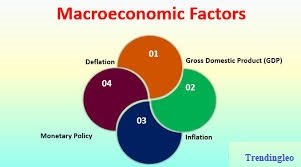Macroeconomics is simply the study of economics from a broader perspective. For example, instead of focusing on the economics of a specific company, macroeconomics would focus on the entire state economy. Monetary policy and inflation go hand in hand, though monetary policy can be helpful in reducing the effect of inflation. Inflation can simply be defined as the increase in prices and salaries that bring down the purchasing power of currency. Monetary policy on the other hand is the regulation embraced by the central banks which brings stability to the prices and maximizes a countries employment and production.
Monetary policy influences directly the rates of interests which finally have a negative correlation with the price levels. With regard to inflation, the central bank of a nation generally turns to an increase in the cash reserve ratio, reverse repo rate and repo rates. The skill is to minimize the currency in supply within the economy which would then bring down the average demand. Such a reduction would aid in bringing down the level of prices. Implementation of monetary policies is with the objective to take advantage and maximize on employment and production which in turn results to a stable nation’s price level. Inflation results when the general price level is rising. It is calculated using the indexes-weighted mean of prices of the cost of various individual commodities.
Inflation
Inflation impacts on real economies in two particular areas: first, it affects the economic efficiency and second the expected total output. The effects on efficiency are that inflation ruins it because it destabilizes prices and price indicators. In a small inflation economy, in areas where the market cost of a product increases, buyers and sellers will understand that there has been a real change attached to supply or demand environment for that product and can respond accordingly. In comparison in a highly inflated economy it is more difficult to differentiate between variations in relative cost and variations in the general price level.
Inflation again damages the use of currency. In this case currency being money has has a zero nominal rate of interest. In cases where there is an annual rise in inflation from maybe 0 to 10%, the actual rate of interest on currency is brought down from 0 to a negative 10 value annually. The can be no measure to rectify such a damage. From the negative actual interest rate on currency, persons prefer dedicating actual resources to minimizing their currency holdings in times of inflation. This is that time when they approach banking institutions occasionally. Actual resources are hence disbursed to acclimatizing to the dynamic monetary milestone instead of making useful investments.
Effect of GDP on Money Supply
Gross domestic product together with money supply does not impact spontaneously on each other, but the supply of currency can impact the gross domestic product according to the policy of money; the articulated purpose in management of economies is to cross check the supply of currency to permit business transactions to be handled. If the supply of cash is limited then it is probable that it will lower the number of transactions thus affecting the gross domestic product. The gross domestic product may only bring about a rise in the demand of currency hence transactions will hit a deadlock in case the demand is not achieved.
Gross domestic product is also not sufficient to gauge actual production, since it does not really characterize production. But it is a dollar value indicator of all transactions that have been handled. An assessment of two statistics might be treasured after the fact to scrutinize the distinction in ratio of growth, to may be signal inflation in the near term, if the growth of currency is too large than Gross domestic product. Currency is not increased as a consequence of greater potential to yield, but it is increased willingly in a bid to permit the huge potential to occur. The supply of cash impacts on the Gross domestic product by making dealings more proficient. There is no need to look for someone to trade with so as to obtain what you are I need of, every individual accepts monetary exchange. The more the currency within reach, the larger this impact is realized. Gross domestic product also affects the supply of money through the banking corporations.
The Effect of Inflation on Monetary Transmission
After thoroughly scrutinizing the building blocks of currencies, I can now elucidate the monetary transmission mechanism, the dimension by which variations in money supply are effected into variations in output, prices, employment and inflation. There is a concern emanating from the Reserve bank on inflation and therefore decided to slow the economy down. This process involves five steps.
To begin the course, the Reserve Bank undertakes measures to moderate bank reserves. Reserve Bank moderates bank reserves predominantly by vending government sanctuaries in the open market. The undertakings of this open market vary the balance sheet of the systems of banking by lowering the total number of bank reserves. Every dollar decrease within a bank reserve yields multiple shrinkages in deposit checks, consequently bringing down the supply of money. From the fact that the supply of money equates to currency plus deposit checks, the lowering of deposit checks lowers the supply of money. The supply of money reduction upsurges the rates of interest and strengthens the conditions for credit. With an unaltered money demands, a lowered money supply will increase the rates of interest. To add on this, the amount of loans borrowing within reach to people will reduce. The rates of interest will increase for borrowers of mortgages and for companies that are in need of constructing factories, adding inventories or purchasing brand equipment’s. Huge interest rates seem to lower the prices of assets hence straining the valuation of other person’s assets.
The supply of money is obviously affected by the central bank policies and frameworks. By putting in place reserve necessities and the rates of discounts, particularly by carrying out open market transactions, the central bank regulates the number of reserves, the short term rates of interests basing on the rates of inflation and the gross domestic product records and the money supply. The rates of inflation and the figures of Gross domestic product have a direct effect on the supply of money in the system because their rise and decrease regulates the amount of money in circulation within the system as necessitated by the central bank. Public associates together with banks are cooperating within this process. Banks establish money by various reserves developments while the public agrees to hold on currency in depository organizations. Macroeconomic factors such as Inflation rates and gross domestic products therefore have a significant effect on supply of money.





I believe this is one of the most vital info for me.
And i’m happy studying your article. But wanna commentary
on some normal issues, The web site taste is
great, the articles is in reality great : D. Just right activity, cheers